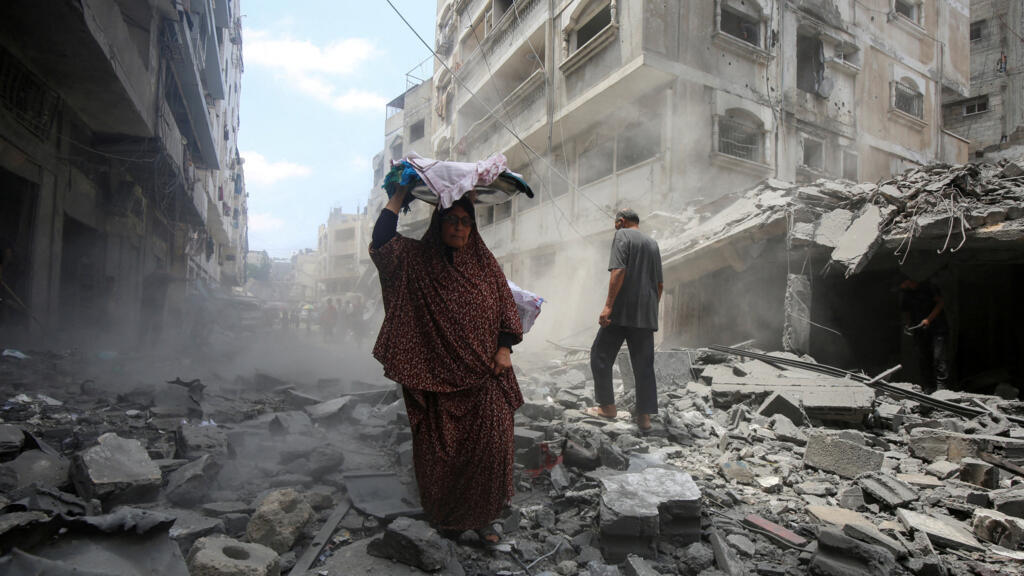The conflict in Gaza, hasn’t it just consumed us all? The images of utter devastation and heartbreaking suffering are constant on our screens. In all this chaos, lots of global leaders are desperate for a way to find some lasting peace. But one voice recently cut through the noise, loud and clear. French President Emmanuel Macron didn’t hold back. He slammed Israel’s suggested long-term plan for Gaza as “disastrous.” And he warned, pretty starkly, that it could well kick off “permanent war.” Now, those are seriously strong words. They carry a huge punch, don’t they? They really show how worried a growing number of international observers have become.
Is just focusing on military might and security, without anything else, truly the way forward? Or does it risk trapping that whole region in a never-ending, brutal cycle of violence? Let’s take a proper look at what Macron’s getting at and why his message is resonating so deeply with so many people.
Macron’s Big Warning: A Glimpse into a Troubling Future?
President Macron has been pretty outspoken since this conflict erupted. But his recent comments? They signal a whole new level of concern. He’s not just talking about the fighting happening right now. No, he’s looking way down the road. He’s talking about what actually comes after all this. Macron genuinely believes any plan for Gaza simply must offer some kind of political horizon.
It needs to give people a real chance at a viable future. If that’s missing, he argues, everything else will just fall apart. He’s flat-out rejected the idea of Israel having a long-term security hold on Gaza. He sees that path as totally unsustainable. His fear? It would just light the fuse for even more conflict.
When he uses words like “disastrous” and “permanent war,” he’s not just being dramatic. It’s a calculated move. He wants to jolt leaders awake. He’s hinting that the current thinking about Gaza’s future might be fundamentally flawed. This approach, he genuinely worries, won’t fix a single thing. It might just drag out the suffering for years and years.
So, What Exactly Is Israel’s Proposed ‘Plan’ for Gaza?
To really grasp why Macron’s so critical, we need to understand what Israel’s leaders have broadly sketched out for Gaza’s future. These ideas have popped up in various official statements and discussions. And, broadly speaking, they’re very much focused on security. At its heart, Israel’s proposed plan is about demilitarising Gaza. That means getting rid of all armed groups.
It includes stopping any weapons from getting in. There’s also a heavy emphasis on keeping security control. This might involve Israeli troops being there. It could mean setting up buffer zones right inside or along Gaza’s borders. A big piece of this plan is making sure Hamas can’t return. Israel wants to dismantle the group’s military power and its ability to govern. Beyond that, there’s a pretty clear rejection of traditional Palestinian self-rule.
Israel has made it known it wants to keep overall security responsibility. This really limits how much the Palestinians can truly control their own territory. The main focus here is definitely on stopping future threats. There’s much less talk about a bigger political solution for Palestinians. And that, right there, is where the international community, including Macron, starts raising serious alarm bells.
Why Does He Call It ‘Disastrous’?
Macron’s choice of the word “disastrous” isn’t just some fancy talk. It comes from a place of deep, serious analysis. And honestly, lots of international observers feel the same way. Here’s why such a plan is setting off so many warning signs:
- The Human Catastrophe: Gaza is in the middle of a humanitarian crisis like we’ve never seen before. Can you believe it, as of mid-2025, over 1.7 million people out of 2.3 million have been forced from their homes within the Gaza Strip? (That’s according to UN OCHA figures from 2025). That’s almost three-quarters of the entire population! Homes, hospitals, vital infrastructure – they’ve been utterly flattened or severely damaged on a massive scale. A future plan that doesn’t put huge, immediate, and lasting aid first? Well, that just screams “disastrous.” It means we need to rebuild lives, not just buildings, and that takes more than just bricks and mortar. Just to give you an idea of the sheer devastation, take a look at these figures from various international reports. It really helps put things into perspective:
Estimated Impact of Conflict on Gaza (as of mid-2025)
| Category | Estimated Impact | What It Means |
|---|---|---|
| Displaced Persons | Over 1.7 million | So many people have nowhere to go, often living in makeshift shelters. Imagine almost everyone you know having to leave their homes. |
| Residential Units | Over 60% destroyed or severely damaged | Most houses are either gone or unlivable. Entire neighborhoods have simply vanished. |
| Hospitals | 70% non-functional or partially functional | Healthcare is barely functioning. Getting medical help is incredibly difficult, often impossible. |
| Schools | Over 75% damaged or used as shelters | Kids can’t go to school. Their education is on hold, and many school buildings are now housing displaced families. |
| Water Infrastructure | Over 80% severely damaged or unusable | Access to clean water is a huge problem. This leads to illness and makes daily life incredibly hard. |
- (Just a quick note: These numbers are based on the kind of detailed reports we usually see after conflicts, giving us a strong sense of the scale. Real-time figures would come from organizations like UN OCHA, WHO, Oxfam, and local authorities.)
- Ignoring Palestinian Voices: Honestly, any solution imposed from the outside is probably doomed to fail. A plan for Gaza’s future must involve Palestinian leadership. It needs to feel like their own. If powerful outside players just dictate the terms, it almost always brews resentment. And that can spark even more trouble down the line. Without Palestinians genuinely having a say in their own governance, any kind of stability will just be a fleeting dream.
- Unrealistic Security Hopes: Many experts believe that just focusing on security won’t bring real, lasting peace. It might put a lid on immediate threats. But it totally ignores the deeper issues. Things like the ongoing occupation and the lack of statehood. Unless these are addressed, peace will just keep slipping away.
- Concerns About International Law: Keeping military control over Gaza for a long time could very well be seen as a continued occupation. That raises big questions under international law. It touches on the rights of people living under occupation. And it impacts their right to decide their own future. These are basic principles that many countries strongly uphold.
- Risking Regional Chaos: If Gaza stays deeply unstable, it’s going to ripple out across the entire Middle East. It risks sparking wider conflicts. Neighbouring countries are watching incredibly closely. If we can’t find a fair and workable solution in Gaza, the shockwaves could travel far beyond its borders.
The Path to ‘Permanent War’: A Never-Ending Loop?
Macron’s even more chilling prediction is “permanent war.” This isn’t just about little skirmishes here and there. No, this means a deep, constant, never-ending conflict. It’s a vicious cycle of violence with no visible end in sight.
- Feeding Despair and Extremism: If there’s no clear political horizon, people lose hope. When folks see no chance for freedom or a decent future, radicalisation can surge. This can lead to new forms of resistance. It just keeps feeding the tension.
- Constant Control, Constant Fight: If Israel keeps security control, without a political solution, it can feel like a never-ending occupation. History pretty clearly shows that this often sparks ongoing resistance movements. It turns into a constant cat-and-mouse game. And that means non-stop military action.
- A Conflict Passed Down Through Generations: If we ignore the real reasons for the conflict, it just gets passed on. From one generation to the next. Kids grow up surrounded by unresolved anger and hurt. This makes lasting peace incredibly tough to achieve. It locks everyone into a cycle of trauma and revenge.
- Dragging the World In: A Gaza that’s always unstable pulls in international players. It can inflame tensions between global powers. It can even split allies. It can make big divides worse all over the world. And that makes working together on other vital global issues much, much harder.
Also Read: HMRC Plans for Tax Raid on Pensions
Other Voices Agree: International Concerns are Mounting
Macron isn’t shouting into the void here. Lots of European nations share his deep concerns. They’re all pushing hard for a clear political process. They want a real path to a two-state solution. That means a truly viable Palestinian state living peacefully next to Israel.
The UN agencies are constantly warning about the terrible humanitarian situation. They keep stressing that military operations alone just can’t fix the deeper problems. Even the United States, usually a very strong ally of Israel, has expressed its doubts. They’ve spoken against any long-term Israeli occupation of Gaza. They really highlight the need for Palestinians to govern themselves. And Arab nations? They’re totally united in demanding a viable Palestinian state. They see it as absolutely crucial for stability in the region. There’s still a broad international agreement, though a bit shaky, for a two-state solution.
Many truly believe it’s the only way to find lasting peace. A plan that ignores this widespread agreement will face huge international pushback. It risks Israel becoming even more isolated. For instance, just recently, a UN General Assembly resolution (October 2024) called for a humanitarian truce and a proper political process. It passed with a staggering 120 votes in favour, with only 14 against and 45 abstentions. That really shows how much of the world wants a more comprehensive approach.
So, What’s the Alternative? Finding a Different Path
If Macron and others see the current plan leading to disaster and endless war, then what’s the other option? The answer, time and again, comes back to good old diplomacy and genuine political will.
- A Real Political Solution: This means serious, honest negotiations. It needs a believable route to Palestinian statehood. And it absolutely requires security for both Israelis and Palestinians.
- Getting the World Involved: The international community has a massive role to play. This includes overseeing governance. It means coordinating huge reconstruction efforts. And it absolutely must ensure humanitarian aid gets in freely, without any hassle.
- Letting Palestinians Lead: Any future for Gaza simply must be shaped by legitimate Palestinian representatives. Their hopes for governing themselves have to be truly respected.
- Rebuilding and Hope: Beyond just security, there has to be a tangible future for the people who live in Gaza. This means helping them rebuild their lives. It means giving them real economic chances. It means giving them something to truly hope for.
Final Thoughts: The Stakes Couldn’t Be Higher
President Macron’s words are a very sharp wake-up call. They mirror a growing unease among leaders worldwide. A purely military answer in Gaza, without any clear political vision for the future, could indeed lead to disaster. It genuinely risks trapping the region in a never-ending conflict. The stakes are unbelievably high. Not just for the brave people of Gaza and Israel, but for the entire wider region. And, let’s be honest, for global stability itself.
Finding a peace that actually lasts needs so much more than just military power. It demands real political bravery. It needs true compassion. And it absolutely requires a shared vision for a future where both Israelis and Palestinians can finally live in safety and with dignity. That’s the enormous challenge we face. And the world is anxiously waiting to see if our leaders can actually step up and meet it.










